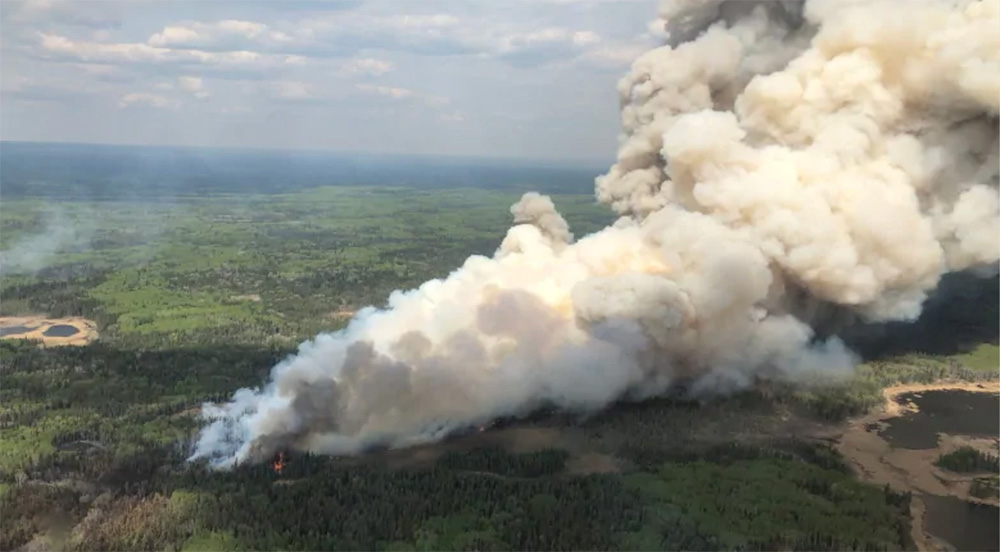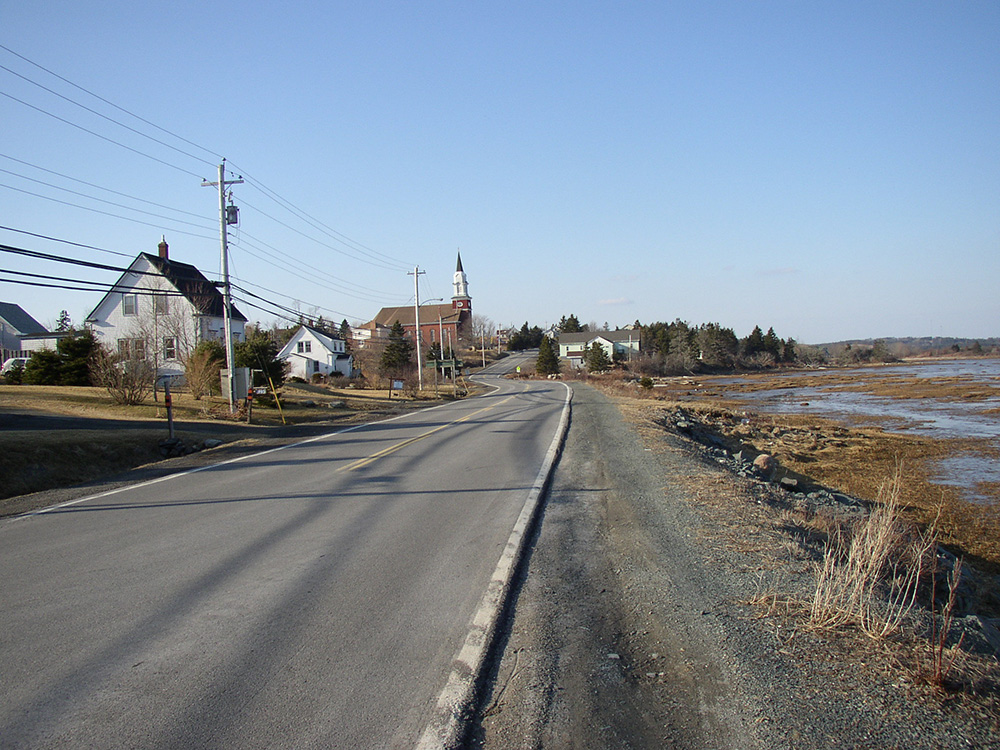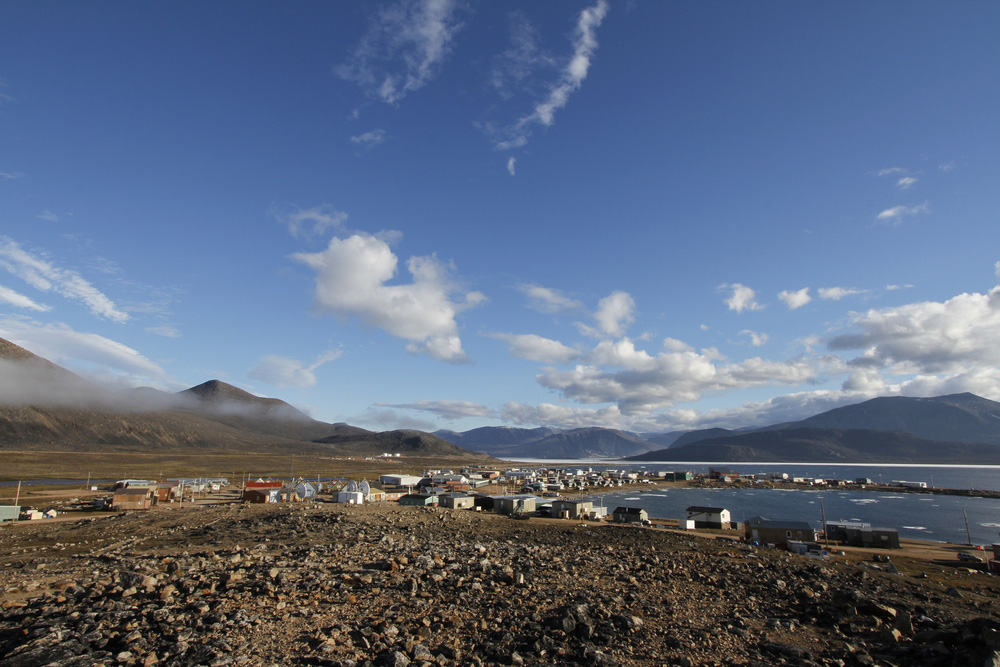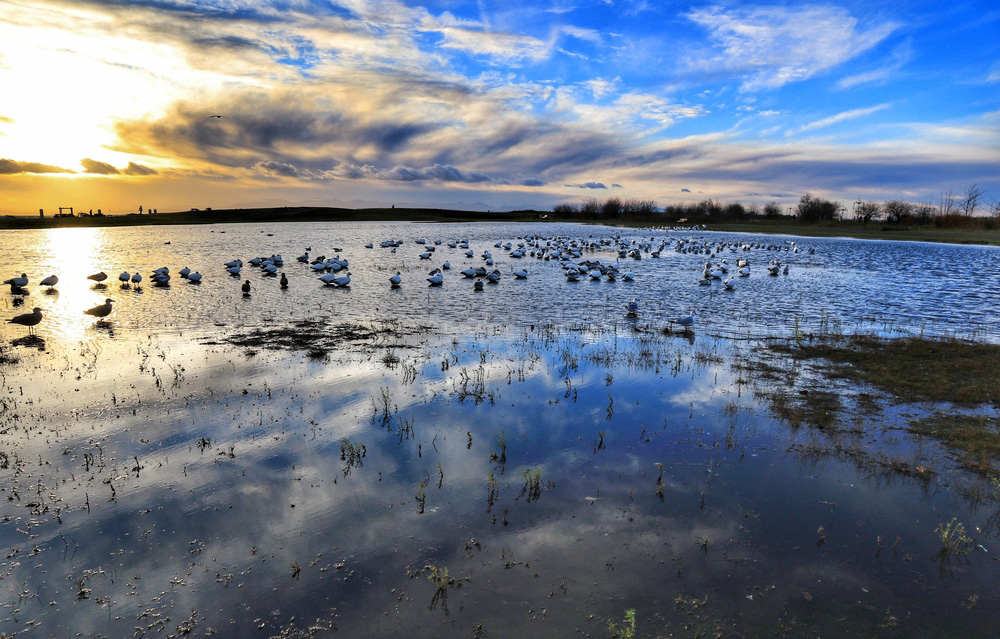The hundreds of thousands of Canadians who marched in the Global Climate Strikes — including over 100,000 in Vancouver — have a simple demand for candidates competing to win election on Oct. 21: acknowledge that we are in a climate emergency and provide a concrete plan for getting us out of it.
Polls suggest that a majority of Canadians view this as a top election issue. And when we asked readers of The Tyee to identify election questions that they want doggedly pursued, this was the number one pick: “Do you agree Canada should be on an emergency footing regarding climate change, and if so what actions will your party take?”
Close behind was this: “How do we transition to a green economy without causing mass unemployment and upheaval?”
So a week ago, we asked those questions where it might matter most, in four ridings across the country that are already facing dire impacts from global heating and could be transformed beyond recognition over the coming decades. They include Richmond-Centre, B.C.; Prince Albert, Sask.; Sackville—Preston—Chezzetcook, N.S.; and Nunavut. Last Thursday, The Tyee asked more than a dozen candidates competing in those ridings for their climate emergency plans. We sent them a reminder on Monday. (Two Green candidates didn’t make the list: Kerri Wall in Prince Albert and Douglas Roy in Nunavut, as their websites lacked contact info, and in Roy’s case even a photo or bio.)
The results were not all that heartening. Only four candidates — two each from the Greens and NDP — provided in-depth responses. Despite multiple requests, no Liberals responded at all. And the one Conservative campaign that replied, that of Prince Albert incumbent Randy Hoback, declined to give a plan, instead directing The Tyee to Tory leader Andrew Scheer’s climate platform, which contains no targets and might actually increase Canada’s emissions.
“Mr. Hoback’s time between now and the election is very limited and will be focused on constituents and local media outlets,” wrote a spokesperson, despite climate change increasing the danger of Prince Albert and much of northern Saskatchewan going up in flames.
Below is a list of who did, and didn’t, reply — as well as ideas for avoiding catastrophe.
1) Richmond-Centre
Climate exposure:
Could be underwater by 2100 unless governments spend billions of dollars on flood defences.
Candidates who didn’t share emergency plans with The Tyee:
Steven Kou, Liberals; Alice Wong, Conservatives; Dustin Innes, NDP
Candidates who responded to Tyee reader questions:
Françoise Raunet, Greens
How is climate change affecting your riding right now?
Richmond-Centre, like all the ridings in the Lower Mainland, is already starting to feel some of the effects of climate change, like smoke from wildfires, longer and more intense droughts, depleted salmon stocks and damage to critical shoreline ecosystems. This results in increased demand on urban infrastructure (i.e. drainage and sewage systems), exposes citizens to an increased risk of respiratory ailments and other health concerns [and] causes water rationing and infrastructure damage due to extreme weather. We’ve even seen a wildfire on federally owned land right next to downtown.
Do you agree Canada should be on an emergency footing regarding climate change, and if so what actions will your party take?
Absolutely! The Green party plans to:
- Declare a climate emergency
- Establish a non-partisan multi-party “climate cabinet” to oversee federal government response
- Set stringent new greenhouse gas targets: 60 per cent below 2005 levels by 2030 and no net emissions by 2050
- Attend the climate negotiation in Chile as a leader, urging other countries to improve their targets
- Restore funding for climate science
- Maintain carbon pricing
- Ban fracking
- Remove all fossil fuels from electricity generation by 2030 and revamp Canada’s east-west grid so that renewable energy can be transmitted from one province to another
- All new cars electric by 2030, and no more internal combustion engines at all by 2040
- Expand and modernize inter-urban rail networks
- National building retrofit — everything carbon neutral by 2030
- Switch to local, small scale biodiesel where possible
- Prioritize adaptation in resource sectors like agriculture, fishing and forestry
- Address emissions that fall outside Paris Agreement: international shipping, aviation and the military
- Reforestation to restore carbon sinks
How do we transition to a green economy without causing mass unemployment and upheaval?
There are more jobs to be had in the new renewable economy than the old 20th-century one based on the extraction of fossil fuels. The Green party plan includes massive investment in skills training and upgrading, including free tuition. Three is no reason why we can’t find meaningful work for everyone once we start re-localizing our economy. Imagine: jobs at the local renewable power plant, jobs building and retrofitting infrastructure, in public transportation, local farming and food production, reforestation, ecosystem protection and rehabilitation, the possibilities are endless. But importantly, the Green plan also includes Guaranteed Liveable Income to help lift everyone to the minimum amount necessary for food and shelter.
2) Prince Albert
Climate exposure: Rising temperatures and drier conditions increase the risk of massive wildfires that could burn cities like Prince Albert to the ground.
Candidates who didn’t share emergency plans with The Tyee: Randy Hoback, Conservatives; Harmony Johnson-Harder, NDP
Candidates who responded to Tyee reader questions: Estelle Hjertaas, Liberals*
How is climate change affecting your riding right now?
- Increasing forest fires north of us have meant more evacuations bringing people into Prince Albert away from the danger of fire. Fires have also meant air quality issues.
- The average temperature is rising, and the weather is already becoming more unpredictable.
- We experienced unusually heavy summer rains about eight years ago, causing widespread flooding. Traditionally the biggest floods in Saskatchewan happened with the snowmelt. Big widespread flooding from June rains is something new.
Do you agree Canada should be on an emergency footing regarding climate change, and if so what actions will your party take?
Yes. Climate change is an urgent threat that must be acted on now. We cannot afford to sit and hope that other countries will solve the problem as the Conservatives suggest.
We have committed to net zero emissions by 2050, with legally binding 5-year milestones. We will:
- Appoint a panel of experts in science, economics and other areas to recommend the best path to reach net zero;
- Introduce a just transition act to ensure energy workers get support needed to succeed in a new green economy;
- Continue to put a price on pollution as a major way to show the true cost of fossil fuels and steer he economy toward a greener future;
- Plant 2 billion trees;
- Restore grasslands, wetlands and coastal areas so they can resume their natural functions including storing carbon;
- Provide free energy audits to homeowners and landowners, and up to $40,000 in interest-free loans for green renovations;
- Provide a Net Zero Homes Grant of up to $5,000 to Canadians purchasing newly built energy-efficient homes;
- Retrofit 1.5 million homes to support Canadians in making their homes more energy-efficient, and better protecting them from climate-related risks;
- Invest $100 million in skills training, to ensure there are enough qualified workers to keep up with energy audits, retrofits, and net-zero home construction;
- Make Energy Star certification mandatory for all new home appliances starting in 2022;
- Move forward with a competition to create four $100-million long-term funds to help attract capital that can be used for deep retrofits of large buildings, such as office towers;
- Create a new $5-billion Clean Power Fund that will support electrification projects and the transition of northern, remote, and Indigenous communities off reliance on diesel-fueled power and onto clean, renewable, reliable industry;
- Install up to 5,000 charging stations along the Trans Canada Highway, and in other major road networks to cover Canada’s urban, rural, and Northern areas, as well as in apartments and condominiums. This will complete the work we started in our first mandate and enable Canadians to travel coast to coast electrically;
- Expand our $5,000 electric vehicle incentive to cover used zero-emission vehicles;
- Require that new federal investments in public transit are used to support zero-emission buses and rail systems starting in 2023;
- Create a new fund to help school boards and municipalities purchase 5,000 zero-emissions school and transit buses over the next five years;
- And explore measures to support the conversion of business fleets, such as those used by taxi and courier companies, and industrial vehicles, like mining trucks.
We will also help adaptation to the reality of climate change by:
- Creating a national flood insurance program
- Working with provinces and territories to map flood risk
- Developing a plan to help relocate homeowners from high-risk locations
How do we transition to a green economy without causing mass unemployment and upheaval?
This is a very complex question but the short answer includes the following points:
- Keep a price on carbon to reflect the true costs of the pollution from fossil fuels and to encourage more efficient use of energy and a shift to green energy;
- Provide incentives to encourage green energy and energy efficiency;
- Hurry the transition by regulation of key industries;
- Make investments and regulatory decisions to obtain the greatest benefit at the least cost;
- Ensure training and support for affected workers;
- Make changes steadily and using market tools to enable innovative people across our country to come up with innovative ways to shift to a greener economy and to provide time for those adjustments to be made. The price on carbon, with the money given back to families, provides the incentive to make change with minimal impact on the economy. Indeed, since most families will get more money back than they spend, they will have more money, most of which will be spent locally. Meanwhile, companies can innovate, instead of having to strictly follow a regulation. Evidence in many areas show this model leads to greater progress and less cost.

3) Sackville—Preston—Chezzetcook
Climate exposure: Sea levels along this coastal riding are expected to rise close to one metre by the end of the century, while nearby Halifax could face 50-year floods every two years.
Candidates who didn’t share emergency plans with The Tyee: Darrell Samson, Liberals; Kevin Copley, Conservatives

Candidates who responded to Tyee reader questions:
Matt Stickland, NDP
How is climate change affecting your riding right now?
The Sackville-Preston-Chezzetcook is home to suburban, rural and coastal communities. These communities heavily rely on the infrastructure that connects the communities together, and to the urban centre that is Halifax.
The issue of climate change affects the residents of these communities in a number of ways, from dry seasons wreaking havoc on agricultural harvests to changes in water temperatures affecting the fisheries industries to property disappearing due to out-of-control erosion. However, one of the most drastic impacts to our community is the growing threat of storm surges during hurricanes, coupled with rising sea waters. We have experienced a number of critical arteries within rural, coastal communities in our riding, as well as elsewhere in the province of Nova Scotia, [be] completely washed away due to frequent storm surges. Where once, 10 years ago, the ocean water would not come near the road, we now must plan an escape route before storms hit to ensure access to food, shelter and emergency services. This new fact of life in our riding, and in our province, is life threatening — yet completely and totally at the fault of exploiting our land and natural resources.
Do you agree Canada should be on an emergency footing regarding climate change, and if so what actions will your party take?
Absolutely. We are committed to ensuring that our government takes climate change seriously. This is why we have put forward a motion and will continue the pressure to declare a climate emergency. We want to ensure that we prioritize reconciliation with Indigenous nations, as well as invest in a respectful, efficient transition that leaves no workers or communities behind. Additionally, we wish to increase the ambition of the 2030 greenhouse gas reduction targets to avoid a more than 1.5 C rise in global warming, as recommended by the IPCC report; include robust rules for implementing the Paris Agreement; prescribe transparency and accountability mechanisms to address climate change; immediately eliminate all federal fossil fuel subsidies, including through Export Development Canada funding; and integrate human health into Canada’s climate commitments.
How do we transition to a green economy without causing mass unemployment and upheaval?
Our climate action plan will spend $1.5 billion over four years to support workers, industries, research and innovation. We also propose to spend $3.5 billion to spur the transition to renewable energy, in addition to funds leveraged through the Canadian Climate Bank. Our strategy will help to advance Canadian innovation and the application of clean tech solutions to secure our industry’s competitiveness, and to market Canadian industry internationally as leaders in the green technology field. We’ll harness the power of Canadian research and development to establish targeted centres of excellence, building on innovations to support the transition to a low carbon economy. Our plan will also expand support and technological assistance to bring more innovative Canadian clean technologies to market through Sustainable Development Technology Canada — creating jobs today and setting Canada up to succeed in the future.
Anthony Edmonds, Greens
How is climate change affecting your riding right now?
The effects of climate change are complex and varied, and specific local events are not necessarily reflective of global changes. Still, there is evidence that the effects of climate change will include more frequent extreme weather events like Hurricane Dorian, which inflicted substantial damage in Nova Scotia. Milder winter temperatures over recent years have also meant that lakes and ponds do not stay frozen as consistently throughout the cold season. Milder temperatures have also facilitated the northward propagation of species such as blacklegged ticks, which are a vector for Lyme disease.
Do you agree Canada should be on an emergency footing regarding climate change, and if so what actions will your party take?
Canada absolutely must be on an emergency footing. My party has proposed forming an emergency climate cabinet with all-party representation to unite Canadians in addressing the climate emergency head-on. The participation of Canadians of all political affiliations, from all segments of society, will provide the necessary mandate [to] transform the Canadian economy for a sustainable future.
How do we transition to a green economy without causing mass unemployment and upheaval?
Workers in fossil fuel industries are at risk of becoming some of the most acute victims of short-sighted energy policies. A just transition to a green economy must include opportunities for these workers to be successful in emerging industries. My party’s plan for a just transition includes measures such as income protection, jobs guarantees, retraining and resettlement for workers in fossil fuel industries. These will be modelled on the recommendations of the Task Force on Just Transition for Canadian Coal Power Workers and Communities, which we would implement in full for workers in all fossil fuel industries.
4) Nunavut
Climate exposure: Canada’s northern regions are warming three times as fast as the rest of the world, resulting in permafrost and sea-ice melting that’s threatening Inuit peoples.
Candidates who didn’t share emergency plans with The Tyee: Megan Pizzo-Lyall, Liberals; Leona Aglukkaq, Conservatives

Candidates who responded to Tyee reader questions:
Mumilaaq Qaqqaq, NDP
How is climate change affecting your riding right now?
In Nunavut we are seeing climate change affecting us drastically. Inuit are approximately 85 per cent of this riding’s population. Our hunting seasons have changed with season lengths becoming longer. This result leads to insects being able to feed off land animals for longer periods of time. We see new insects in our territory, and animals are coming closer to communities causing concerns around safety. Predators, like polar bears, are coming very close or into communities in search of food. Our traditional food sources are threatened.
There are changes in ice conditions, permafrost and precipitation. We have seen glaciers disappear, and snow that used to be on the ground all year round in some areas melts in the warmer months. Unpredictable ice conditions are an enormous concern to the safety of hunters. Climate change is not just a threat to Nunavummiut but to all of our ecosystems in the north.
Do you agree Canada should be on an emergency footing regarding climate change, and if so what actions will your party take?
Canada needs to take on an emergency footing regarding climate change. The NDP will uphold Indigenous knowledge as Indigenous peoples have an intimate connection to our homelands and the resources it carries. Inuit in Nunavut will have a seat at high-level decision-making tables. An expansion to the Indigenous Guardians Program will be made; we are at the frontline of the direct impacts of climate change. We will invest in Indigenous-led science and support and work jointly with Indigenous leadership and communities. In this partnership, we will co-ordinate an action plan to respond to climate change emergencies. NDP will ensure species recovery efforts respect Indigenous rights and embrace traditional knowledge. Existing infrastructure will be improved, new infrastructure will be developed, and we will support response efforts to keep people safe. Through partnership jobs will be created, employment training will be provided, and infrastructure investments will flow from federal efforts to address climate change.
How do we transition to a green economy without causing mass unemployment and upheaval?
The global climate is changing, and Canadian jobs will change too. We can do better. New Democrats believe that any climate change plan that leaves Canadian workers or regions behind is no plan at all. Our plan will create over 300,000 good jobs in all communities within a first mandate, and rebuild local economies with meaningful, family-sustaining work in every part of the country, all while helping to make the changes we need to succeed in a low-carbon future.
New Democrats are making a commitment to workers most impacted by the changes in our economy. We will work together with labour, employers, and the provinces and territories to find solutions for workers and communities, including dedicated employment support that combines access to expanded EI benefits, retraining and job placement services, paired with significant investments to create quality local jobs and support thriving communities.
We will also expand support and technological assistance to bring more innovative Canadian clean technologies to market and support manufacturing right here at home. New Democrats will also vigorously defend pensions, so that workers can always count on the retirement security that they’ve earned, and make sure that people who are close to the end of their careers have a bridge to a dignified retirement. An important part of our plan will include making sure that physical, digital and social infrastructure investments contribute to emissions reductions and support all regions and communities, especially those already experiencing the impacts of climate change with the good, family-sustaining jobs they bring.
*Story updated at 8:30 a.m. on Oct. 15. to include the response of Estelle Hjertaas, the Liberal candidate for Prince Albert. ![]()
Read more: Election 2019, Federal Politics, Environment


















Tyee Commenting Guidelines
Comments that violate guidelines risk being deleted, and violations may result in a temporary or permanent user ban. Maintain the spirit of good conversation to stay in the discussion.
*Please note The Tyee is not a forum for spreading misinformation about COVID-19, denying its existence or minimizing its risk to public health.
Do:
Do not: